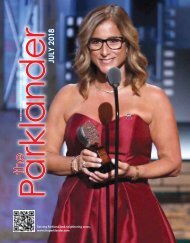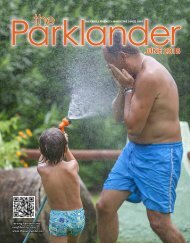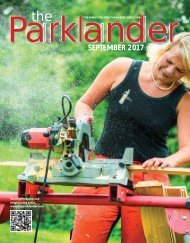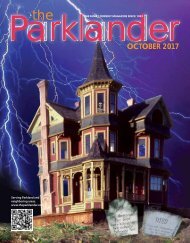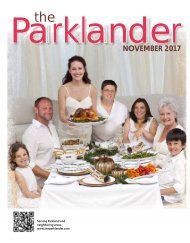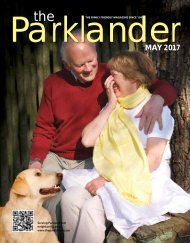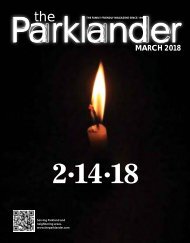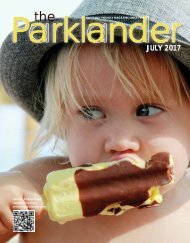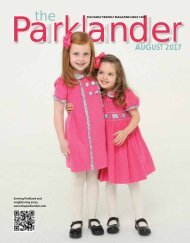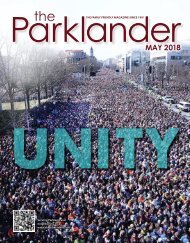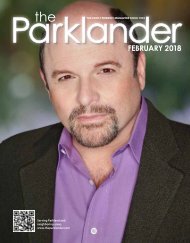June 2017
You also want an ePaper? Increase the reach of your titles
YUMPU automatically turns print PDFs into web optimized ePapers that Google loves.
PROFILE<br />
Daniel Perez with his<br />
life partner, Robin S.<br />
Crouch, at a fundraiser<br />
for the Patriots<br />
Placement organization.<br />
by Aaron Krause<br />
America is Parkland resident<br />
Daniel Perez’s “adopted mother,”<br />
the Cuban native said.<br />
The nation welcomed him and his<br />
family in 1960 after the Cuban<br />
Revolution put Fidel Castro in<br />
power and forever changed the lives of<br />
thousands of Cuban natives who, if they<br />
were lucky enough, were able to flee to<br />
freedom.<br />
Perez, a member of the board of trustees<br />
for the American Museum of the Cuban<br />
Diaspora, was among the original political<br />
exiles to leave their homeland for the<br />
United States.<br />
“We are the most profound<br />
example of the American<br />
dream,” he said.<br />
On Oct. 10, 1960, an almost 4-year-old<br />
Perez, his mother, Gloria (who died in<br />
1998), father, Gonzalo (“89 and kicking”),<br />
and paternal grandmother, Irene (who<br />
died in 1968), boarded a Delta DC-3<br />
bound for Chicago’s Midway Airport,<br />
where they arrived amid a snowy<br />
landscape. Perez said he and his family<br />
settled in Chicago because it was one of<br />
the most industrialized cities in the world.<br />
“I came (to the U.S.) by the grace of God,”<br />
said the 60-year-old Perez, who speaks<br />
quickly and with a quiet conviction.<br />
Ever since Perez was 14, he has felt an<br />
obligation to give back to the country<br />
that accepted him and his family, allowing<br />
them to pursue the American Dream.<br />
22<br />
At the time, when Perez<br />
walked to school, he<br />
would notice blue stars<br />
in the windows of homes, a symbol that<br />
a member of the household is serving in<br />
the armed forces. The then youngster<br />
also noticed gold stars, which symbolize<br />
servicemen and women killed in service.<br />
He joined the Reserve Officers Training<br />
Corps in his freshman year in high school.<br />
Six months before graduating high school,<br />
Perez joined the military on his 17th<br />
birthday, five minutes after midnight.<br />
Perez served in the Army with a<br />
specialized unit involved with national<br />
security. He was stationed stateside<br />
and abroad. “It was gratifying, very<br />
much so,” Perez said about his<br />
service.<br />
He entered the military in 1974, during<br />
Richard Nixon’s presidency and left in<br />
1995, when Clinton was president. He<br />
also served as secretary of the Vietnam<br />
Veterans of America Florida State Council.<br />
Perez qualified as a Vietnam veteran<br />
since his military service came during the<br />
conflict in that country. Vietnam veterans<br />
coming home were “the guys who taught<br />
me everything in life,” Perez said. “They<br />
were my cadre.”<br />
Perez also served the state by<br />
working with lawmakers in Florida and<br />
Washington, D.C., to create and enforce<br />
laws that would benefit Vietnam veterans.<br />
One of those laws made Florida the first<br />
state to become a “Veterans First State,”<br />
meaning it gave preference to veterans<br />
when jobs would open.<br />
JUNE <strong>2017</strong><br />
In his civilian jobs, Perez has also served<br />
his community by, for example, cracking<br />
down on unethical car towing practices<br />
through one of his companies. Instead of<br />
immediately towing cars, drivers receive<br />
two to three warnings before action is<br />
taken. That action comes in the form<br />
of booting cars, which saves the driver<br />
money and worry that his car might have<br />
been stolen, Perez said.<br />
He got involved with the American<br />
Museum of the Cuban Diaspora while<br />
visiting the facility in February during a<br />
membership drive. A trustee suggested<br />
he consider joining the board. “I said ‘yes,<br />
absolutely,’” Perez recalled. A week later,<br />
he was a board member.<br />
“I think it’s done wonderful work,” Perez<br />
said about the museum. He said he’s just<br />
sad he’s not able to share the experience<br />
with his mother. “She is the person who<br />
made me into who I am today,” he said.<br />
While he views America as his “adopted<br />
mother,” he sees Cuba as “forbidden<br />
fruit;” it’s “so close, yet so far.” “I will<br />
not step onto Cuban soil until the entire<br />
regime is gone and the country returns to<br />
a democratic republic,” he said. P




